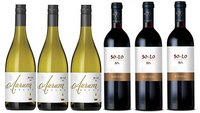Archives
October 2020
August 2020
June 2020
April 2020
January 2020
August 2019
July 2019
May 2019
August 2018
July 2018
May 2018
March 2018
November 2017
August 2017
February 2017
September 2016
January 2015
September 2014
July 2014
June 2014
May 2014
October 2013
July 2013
June 2013
May 2013
April 2013
March 2013
February 2013
January 2013
December 2012
November 2012
September 2012
August 2012
May 2012
April 2012
13 May 2013
Low Sulphite, Natural and Sulphite Free Wine

What are Sulphites?
Sulphites are occurring ions that exist commonly in wine. It is an inclusive term for sulphur dioxide (SO2) that is a preservative, used in wine and foods for its antibacterial and antioxidant characteristics. The number of sulphites found in the wine plays a major role in maintains a wine freshness and are used to ensure a longer shelf life and decrease risk dramatically for the wine maker. There are however sulphite free wines and natural wines that are made by dedicated wine makers that use a minimal amount of sulphur in their wines.
What happens when I consume Sulphites?
Consumption of sulphites is generally harmless, unless you happen to have severe asthma or do not have the particular enzymes necessary to break down the sulphites in your body; meaning a sulphite allergy. This is believed to affect around 1 in 10 people. The number of sulphites in wine is regulated all over the world and any wine that contains more than 10 parts per million (ppm) of sulphur dioxide must affix the label ‘contains sulphites’.
Why are sulphites necessary in Wine?
There are very few wines made without any sulphites at all. There are an increasing number of wines that are made without the inclusion of sulphites; but the majority will have at least some sulphur content. This is because wine is perishable, prone to oxidation and the development of aldehyde off-odours that can destroy the product. Wines made without SO2 have a significantly lower shelf life and must be kept in perfect storage conditions, otherwise they will be faulty when opened and consumed. Given that the winemaker has very little control over the storage and delivery of the wine, they are taking a big risk by producing this type of wine – hence the inclusion of sulphur.
‘Sulphite Free’, ‘Low Sulphite’ and ‘Natural Wines’
Although less common that ‘standard’ wine that contains sulphites, there are more and more natural wines becoming available on the market, through wine merchants, supermarkets and online stores. Aside from being safe for someone with a sulphite allergy to consume, these wines will not leave you with a hangover and will not give your body the additives and preservatives it really doesn’t need. For these reasons, this type of wine is healthier and becoming more and more desirable. Although you may pay more for a bottle of wine like this, it is by no means unreasonable – and given the risk the wine maker takes by supplying you with them with more attention to detail, care and delivery/storage process, it is well worth the spend.